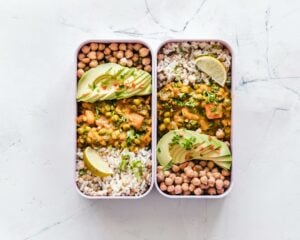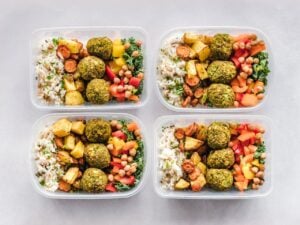Transitioning Into a Plant-Based Diet For Beginners

Giving up meat has a tremendous amount of benefits, and more people transition into a plant-based diet every day. While adopting a plant-based diet may not be for everyone, those who do tend to feel the effects rapidly. Making a few adjustments to your diet and lifestyle can help make you healthier and happier, and decrease your environmental impact.
Learning how to start a plant-based diet may seem intimidating at first, but it’s actually easier than you think. We’ve put together this guide on a plant-based diet for beginners to help you make the switch, and start living a healthier life.
It is always a good idea to speak with your doctor before making any major changes to your diet.
What Is A Plant-Based Diet?
A plant-based diet is, as the name suggests, a diet where protein and other nutrients are received without consuming any animal products. While meat is dense in nutrients and protein, it is also high in calories and fat. People who switch to a plant-based diet have reported numerous benefits, and it’s easier than ever to experience the benefits for yourself!
Key Plant-Based Diet Benefits
1. Stronger Immune System
One of the top plant-based diet benefits is an increase in the strength of your immune system. Getting your nutrients from plant sources is a much more efficient way to load your system with essential vitamins and nutrients. Your immune system needs these ingredients to thrive, and eating a plant-based diet is a great way to avoid deficiencies.
2. Reduced Inflammation
Inflammation is a leading cause of disease and other ailments like cancer, cardiovascular disease, and chronic inflammatory disease. A high intake of fruits, vegetables, and whole wheat is associated with lower levels of inflammation according to this NIH study. Transitioning into a plant-based diet may give you an extra leg up when it comes to reducing inflammation and its associated problems.
3. Easy On The Environment
Transitioning into a plant-based diet can not only reduce your waistline but reduce your carbon footprint as well. The production of factory-farmed meat requires many more resources to produce than most plant-based foods. PCRM reports that the production of meat releases carbon and other gases into the atmosphere, contributing to the greenhouse effect we are experiencing today. Eating a plant-based diet is more sustainable for the planet, helping you to leave a smaller impact on the environment.
4. Decreased Risk Of Cancer
NIH research shows that 30-40% of cancers can be avoided through diet and nutrition alone. Eating a plant-based diet high in nutrients has been shown to reduce the risk of many types of cancer. While cancer is not 100% avoidable in some cases, transitioning to a vegan diet can have tremendous benefits against cancer formation.
5. Lose Weight
Eating a plant-based diet high in fiber can help you to feel full faster, eat less, and lose weight. Animal products are typically more dense in calories and can contribute to weight gain over a period of time. Transitioning into a plant-based diet can help you eat more sensible portions, and help you shed a few pounds in the process.
How to Start a Plant-Based Diet
It’s easy to feel intimidated when wondering how to start a plant-based diet. Not knowing what or how to eat can deter many people from giving up animal products, but transitioning to a plant-based diet is simpler than you think! It is easier than ever to eat a high-quality vegan diet, whether you are cooking the meals yourself, eating at a restaurant, or having the food delivered directly to your door.
Research
Researching what you can eat on a plant-based diet is the first step towards making the switch. It is important that you are eating enough nutrients to sustain your body. Everybody is different, so depending on your lifestyle you may need more protein than others, but it is totally possible to get adequate nutrients.
The other big topic of research when starting a plant-based diet for beginners is recipes. There are endless sources of high-quality plant-based recipes on the internet. Of course, some will be better than others, and easier to prepare than others, so it is important to find plant-based recipes that align with your tastes and skillset in the kitchen.
Read more about how to select fresh ingredients for your plant-based recipes.
Plant-Based Restaurants
Plant-based restaurants are becoming more popular every year.. Vegan and vegetarian restaurants are a great way to consistently get plant-based food in your diet without the hassle of having to learn what you can eat on a vegan diet. Even if you don’t go to a strictly plant-based restaurant, most restaurants nowadays will have plant-based options to accommodate guests. It is always helpful to ask your server or other restaurant employees about the best plant-based menu options.
Meal Delivery Services
Meal delivery services have exploded into the mainstream in the past decade. Having perfectly portioned food delivered right to your door makes it easier than ever to transition into a plant-based diet. Meal delivery services take all of the guesswork out of planning vegan meals, while still delivering all of the plant-based diet benefits.
Read more about the best vegetarian meal delivery services.
What Can You Eat On a Plant-Based Diet?
Simply put, what you can eat on a plant-based diet boils down to what you want to eat. Just because you transition to a plant-based diet doesn’t mean that you have to suddenly develop a taste for artichokes or mushrooms. There are thousands of edible plants on our planet, with new and innovative ways of preparing them being discovered every day. Your plant-based diet food list will differ from your neighbor’s, it’s all about finding the right diet for you and your needs.
Here is a list of plant-based foods you may enjoy:
Plant-Based Diet Food List
| Produce | Whole-Grain | Legumes | Nuts & Seeds | Dairy & Egg Alternatives | Meat Alternatives |
| Apples | Amarath | Black Beans | Almonds | Non-Dairy Milk | Tofu |
| Artichokes | Barley | Black-eyed Peas | Brazil Nuts | Plant-Based Yogurt | Tempeh |
| Asparagus | Bulgur | Kidney Beans | Cashews | Plant-Based Cheese | Plant-Based Meat |
| Avocado | Farro | Navy Beans | Chia Seeds | Dairy-Free Butter | |
| Beets | Freekeh | Pinto Beans | Flax Seeds | Dairy-Free Cream Cheese | |
| Bell Peppers | Kamut | Lima Beans | Hazelnuts | Egg Alternatives | |
| Berries | Millet | Peas | Hemp Seeds | ||
| Cabbage | Oats | Chickpeas | Pecans | ||
| Carrots | Quinoa | Edamame | Pine Nuts | ||
| Cauliflower | Rice | Hummus | Pistachios | ||
| Cucumber | Spelt | Lentils | Sunflower Seeds | ||
| Eggplant | Teff | Peanuts | Tahini | ||
| Grapefruit | Walnuts | ||||
| Kiwi | |||||
| Leafy Greens | |||||
| Mushrooms | |||||
| Onions | |||||
| Potatoes | |||||
| Zucchini |
Read more about our comprehensive plant-based protein guide.
Gobble Is Here to Help
When you order a subscription with Gobble, you are taking much of the hassle out of starting a plant-based diet. It works by selecting your menu from our giant collection of recipes, and meals get delivered right to your door and are ready in 15 minutes or less. Using a meal delivery service, you can transition into a vegan diet without the hassle of shopping, chopping, and minimal cleanup. Give Gobble a try, and feel the benefits of a plant-based diet immediately!



